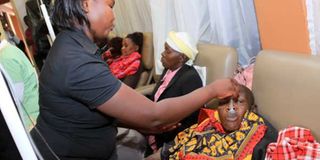Partnership to increase access to lifesaving cancer treatments

Patients undergo chemotherapy at the Texas Cancer Centre in Nairobi. A partnership between global health organisations and pharmaceuticals will increase access to life-saving cancer drugs. PHOTO | JEFF ANGOTE
What you need to know:
- The agreements will set competitive prices for the medicines, thus allowing African governments to realise substantial savings while improving the quality of available treatment.
- This announcement comes almost a month after the World Health Organisation (WHO) launched a pilot project to explore the potential of cheap copies of expensive cancer drugs.
- The cancer burden is mounting in sub-Saharan Africa and deaths remain high due to late diagnosis and lack of treatment. In 2012, there were an estimated 626,000 new cases of cancer and 447,000 cancer deaths in the region.
Two global health organisations have partnered with two giant pharmaceutical companies to increase access to lifesaving cancer treatment in six African countries.
The American Cancer Society and the Clinton Health Access Initiative announced a partnership with the American Pharmaceutical Corporation, Pfizer and Cipla, an Indian multinational pharmaceutical and biotechnology company. They plan to expand access to 16 essential cancer medications including chemotherapies in Ethiopia, Nigeria, Kenya, Uganda, Rwanda and Tanzania.
The agreements will set competitive prices for the medicines, thus allowing African governments to realise substantial savings while improving the quality of available treatment. Currently, one gramme of Gemcitabine costs Sh19,800 while 300 g of Paclitaxel cost about Sh19,720.
Pfizer’s 120 mg of Docetaxel costs Sh18,750 while Cipla’s Anastrazole and Bleomycin costs Sh168 per tablet and Sh1,950 (15 units) respectively. Under the partnership, these prices will now be cut by half.
This announcement comes almost a month after the World Health Organisation (WHO) launched a pilot project to explore the potential of cheap copies of expensive cancer drugs.
CHALLENGES GALORE
In a bid to make lifesaving drugs more widely available in poorer countries, the WHO announced that from September it will accept applications from drug manufacturers seeking assessment of biosimilar versions of two cancer drugs: Rituxam, marketed generically as rituximab, (used to treat blood cancers) and Herceptin, also known as trastuzumab, (used to treat breast cancer).
The two drugs are already part of the WHO’s essential medicines list. “Cancer has emerged as a major public health problem in sub-Saharan Africa and we are committed to working with stakeholders to tackle this growing health threat,” said Richard Blackburn, Global President, Europe, Africa, Middle East, and Biosimilars, at Pfizer Essential Health.
The cancer burden is mounting in sub-Saharan Africa and deaths remain high due to late diagnosis and lack of treatment. In 2012, there were an estimated 626,000 new cases of cancer and 447,000 cancer deaths in the region.
“The state of cancer treatment in Africa today is very reminiscent of the challenges faced when working to increase access to lifesaving antiretroviral therapy for HIV/AIDS over a decade ago,” noted Ira Magaziner, chief executive officer of the Clinton Health Access Initiative.
Apart from access to high-quality, affordable chemotherapeutic agents, many more issues such as access to treatment facilities and workforce shortages need to be addressed.
The two organisations are working with pro bono with IBM Health Corps to develop and deploy a chemotherapy forecasting software that will help countries quantify their cancer medicine needs and plan budgets and procurement.
Uganda is beginning to use the software and five more countries are expected to follow suit by the end of this year.



